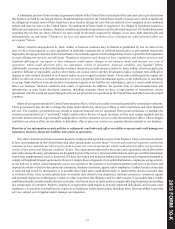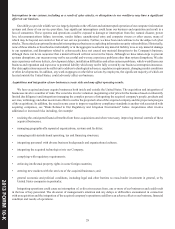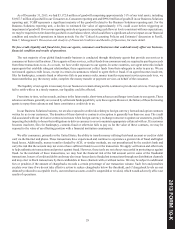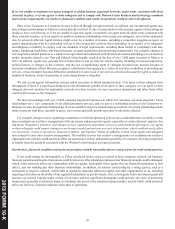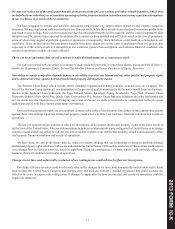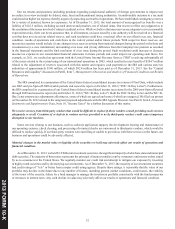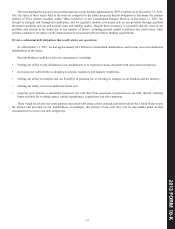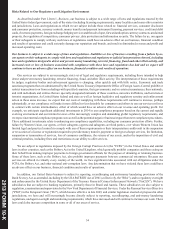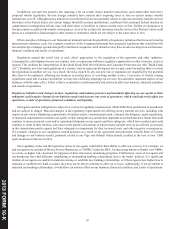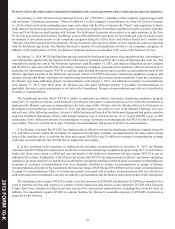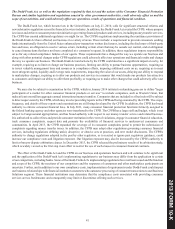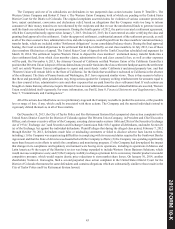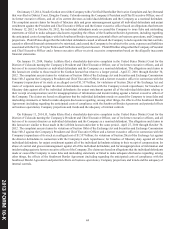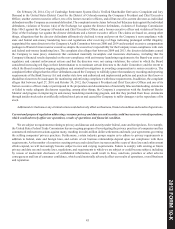Western Union 2013 Annual Report Download - page 147
Download and view the complete annual report
Please find page 147 of the 2013 Western Union annual report below. You can navigate through the pages in the report by either clicking on the pages listed below, or by using the keyword search tool below to find specific information within the annual report.
2013 FORM 10-K
37
The types of enterprises that are legally authorized to act as our agents vary significantly from one country to another. Changes
in the laws affecting the kinds of entities that are permitted to act as money transfer agents (such as changes in requirements for
capitalization or ownership) could adversely affect our ability to distribute our services and the cost of providing such services,
both by us and our agents. For example, a requirement that a money transfer provider be a bank or other highly regulated financial
entity could increase significantly the cost of providing our services in many countries where that requirement does not exist today
or could prevent us from offering our services in an affected country. Further, any changes in law that would require us to provide
directly the money transfer services to consumers as opposed to through an agent network (which would effectively change our
business model) or that would prohibit or impede the use of subagents could significantly adversely impact our ability to provide
our services, and/or the cost of our services, in the relevant jurisdiction. Changes mandated by laws which make Western Union
responsible for acts of its agents while they are providing the Western Union money transfer service increase our risk of regulatory
liability and our costs to monitor our agents' performance.
Although most of our Orlandi Valuta and Vigo branded agents also offer money transfer services of our competitors, most of
our Western Union branded agents have agreed to offer only our money transfer services. While we expect to continue signing
agents under exclusive arrangements and believe that these agreements are valid and enforceable, changes in laws regulating
competition or in the interpretation of those laws could undermine our ability to enforce them in the future. Over the past several
years, several countries in Eastern Europe, the Commonwealth of Independent States, Africa and South Asia, including India, have
promulgated laws or regulations, or authorities in these countries have issued orders, which effectively prohibit payment service
providers, such as money transfer companies, from agreeing to exclusive arrangements with agents in those countries. Certain
institutions, non-governmental organizations and others are actively advocating against exclusive arrangements in money transfer
agent agreements. Advocates for laws prohibiting or limiting exclusive agreements continue to push for enactment of similar laws
in other jurisdictions. In addition to legal challenges, certain of our agents and their subagents have refused to enter into exclusive
arrangements. See risk factor "If we are unable to maintain our agent, subagent or global business payments networks under terms
consistent with those currently in place, or if our agents or their subagents fail to comply with Western Union business and
technology standards and contract requirements, our business, financial condition and results of operations would be adversely
affected" above.
The Foreign Account Tax Compliance provisions of the Hiring Incentives to Restore Employment Act ("FATCA"), which is
intended to address tax compliance issues related to United States taxpayers holding non-United States accounts, may require
some of our business units outside the United States to report to the IRS, directly or through foreign government agencies cooperating
with the IRS, information about financial transactions made by United States taxpayers and other specified entities or individuals,
and could impose withholding, documentation and reporting requirements on such transactions. This provision may also affect
withholding, documentation, and reporting requirements of certain payments made to non-United States recipients. Full
implementation of FATCA will be phased in over a multi-year period. The additional administrative requirements of FATCA may
result in increased compliance costs and could have an adverse effect on our business, financial condition, or results of operations.
In addition to legal or regulatory restrictions discussed in the "Capital Resources and Liquidity" section in Part II, Item 7,
Management's Discussion and Analysis of Financial Condition and Results of Operations, some jurisdictions use tangible net
worth and other financial strength guidelines to evaluate financial position. If our regulated subsidiaries do not abide by these
guidelines, they may be subject to heightened review by these jurisdictions, and the jurisdictions may be more likely to impose
new formal financial strength requirements. Additional financial strength requirements imposed on our regulated subsidiaries or
significant changes in the regulatory environment for money transfer providers could impact our primary source of liquidity.


